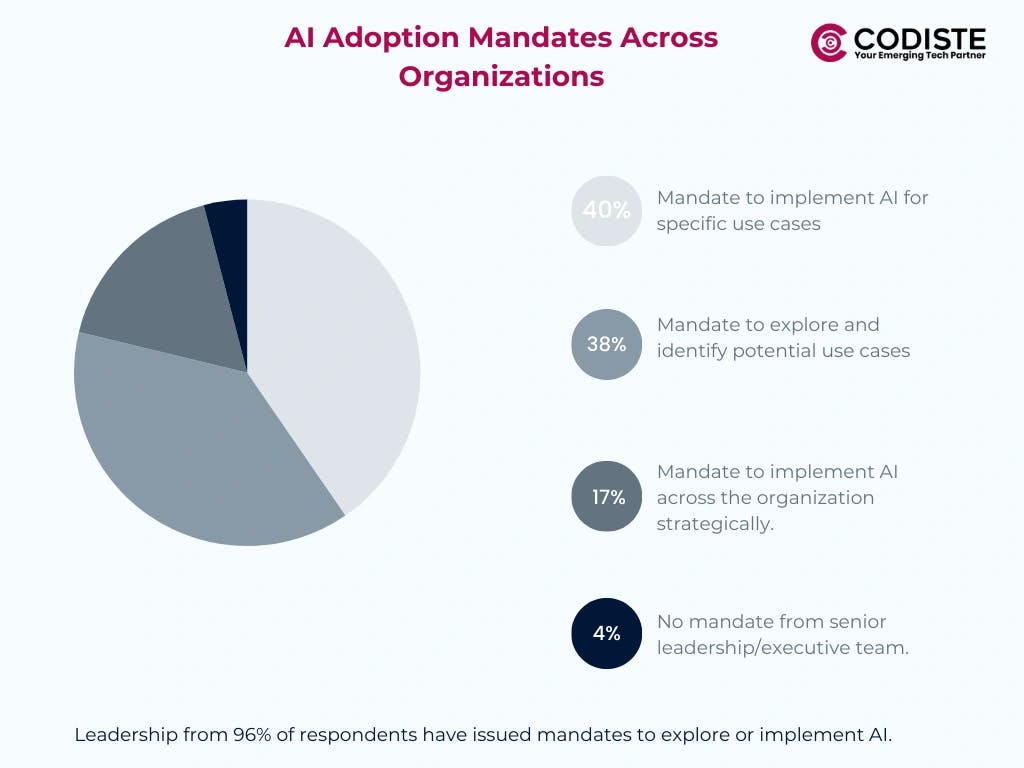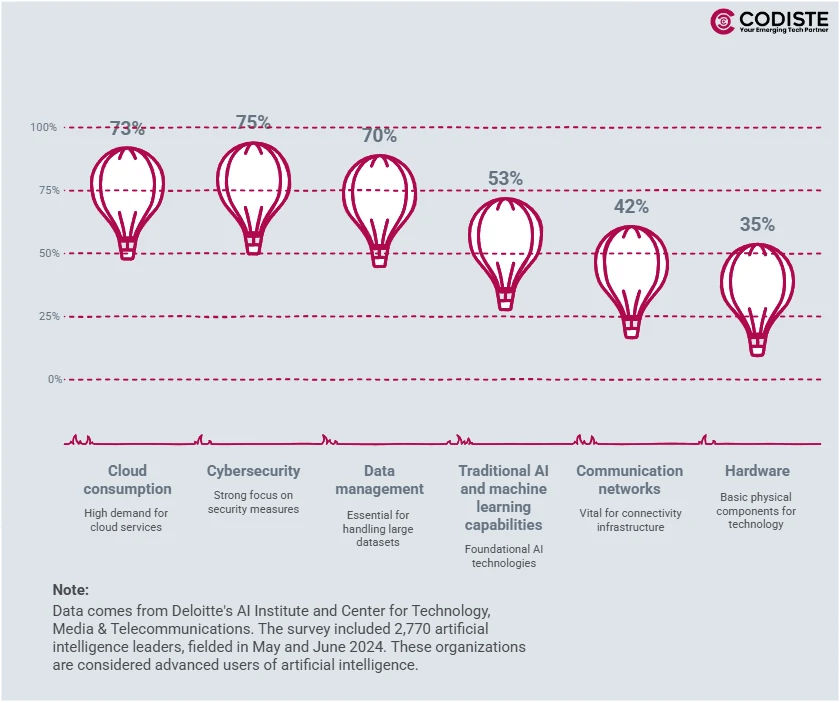
,
Generative AI is a breakthrough technology and has a huge impact on the business world, such as task automation, content creation and the growth of data-based decision-making processes. Be it a result of personalized advertising or industrial structural designs, the range of opportunities presented by generative AI is impressively large. In this regard, SAP's report claims that 96% of participants are looking to implement AI in their work.

Even though standard AI solutions are the preferred approach at first, businesses are changing their priorities towards specialized AI models. These customized platforms deal with custom problems and so they have the abilities only generic models don’t have. For instance, with a custom generative AI model, one can simplify business processes, detect fraud automatically, or enhance customer satisfaction through multi-agent collaboration.
Nonetheless, most companies evaluate the effectiveness of their AI investments based on metrics like ROI and revenue growth that are the traditional ones. However, these may not be adequate to get the full effect of the broader, long-term Generative AI investment benefits. To know the true worth of this technology, companies should think about more than just immediate financial gains.
This article looks into the reasons for the failure of the traditional metrics and how the development of custom AI could reshape success in business over the long run.
Key Metrics Evaluation of Traditional Metrics and Long-Term Impact of Gen AI
Evaluating ROI, market share and revenue growth is what happens foremost when AI investments are being discussed in the face of new technology. These numbers are tangible and provide stakeholders with a sense of immediate value. For example, a company that examines the generative AI development project might see how much it reduces operating expenses in a year.
However, such metrics often overlook the full potential of custom generative AI. Here’s why:
- Short-Term Focus: Metrics like ROI usually account for gains within a limited timeframe, ignoring benefits that emerge over the years.
- Non-Financial Gains: Factors such as employee satisfaction, process efficiency and customer loyalty that are difficult to measure, yet remain essential factors for the success of the organization.
- Missed Innovation Opportunities: The traditional metrics do not show how it is even possible to invent custom AI technology to create a whole new business model.
For example, a retail company that uses an AI agent to identify and prevent fraud might not see sustainable money savings to begin with. The technology would be of considerable value and could eventually become a brand protector and trust-builder for customers. This would result in increased competitive advantages.
Moreover, only concentrating on financial profits can mean an insufficient amount of resources have been spent on important aspects such as AI ethics, safety and scalability.
Key Areas of Long-Term Impact of Custom Generative AI Investment
The application of custom generative AI may outweigh all conventional evaluations due to various long-lasting effects:
1.Enterprise Workflow Optimization
Tasks that require human intelligence and are often repetitive can be easily automated. This increases efficiency and reduces errors by using custom generative AI models. Creating AI agents using no-code tools that organically evolve into systems that interface with various workflows in enterprises, can help organizations grow. Over time, it results in:
- Less hands-on work for the personnel.
- Scalability of the system.
- Improved resource allocation management through increased efficiency.
For example, a logistics company implemented a custom AI system that was specifically designed to optimize the supply chain operations. The immediate savings were not impressive, although the long-term increases were more than enough to put them on top of the market when it comes to delivery speed and accuracy.
2. Enhanced Collaboration Through Multi-Agent Systems
Generating AI enables multi-agent collaboration, thus organizing AI systems to cooperate and solve problems better. These can be realized through collaborations of AI and AI that can demonstrate:
- Diversify perspectives presented in order to enhance decision-making.
- Workflow''s improvements across departments.
- A synchronized use of AI.
In the long run, multi-agent systems may behave as the guiding lights to the cross-functional teams They would benefit from the unified approach to solving business challenges.

3. Resilience and Risk Management
Custom AI solutions can be used to detect fraud incidents before they happen. For fraud detection, AI Agent automates fraud detection by examining vast amounts of data in real time, delivering:
- Better security.
- Long-term savings due to fraud reduction.
- Building trust among all stakeholders.
Take a financial institution as an example, which uses AI to detect fraud. Initially, the focus remained at the transaction monitoring level. Over time, the evolution of the system took a new path by predicting emerging threats.
4. Innovation and Competitive Edge
Custom AI models let businesses come up with innovative solutions by using unique data insights. For example:
- A software company can develop a solution specifically designed to predict maintenance in a manufacturing facility, this way it can reduce downtime.
- Retailers can use their own AI to personalize customer journeys thus accelerating customer retention in the long run.
5. Sustainability and Social Impact
The AI systems designed for sustainability provide the opportunity for a greener supply chain. As time goes by, such programs bring companies into line with globally accepted environmental targets. This in turn boosts their marketing image and customer retention.
Take for example, a self-developed AI model applied by a manufacturing company may bring down electricity consumption. Thus providing both cost reductions and environmental protection.
Measuring and Assessing Long-Term Impact of Custom Gen AI Investment
To be able to fully understand the importance of investments in custom generative AI, companies need to make changes to the measuring frameworks:
1. Longitudinal Studies
Watching the course of implementation over a period of years should be done so as to be able to evaluate their evolution. This can also provide information on understanding the impact of the system contributing to the organization's goal.
2. Hybrid Metrics
Combine traditional accounting metrics with quality considerations, such as:
- Employee productivity.
- Customer satisfaction.
- Innovation rate (e.g., new product launches).
3. Scenario Analysis
Create models that use prediction to forecast whether or not a customized AI solution can be used successfully in various market scenarios. For example, companies can simulate the far-reaching advantages of digitizing the work processes in fraud detection methods.
4. Feedback Loops
Create systems integrated with AI that perpetually obtain feedback from users so that models are adaptive and efficient in the long run.
5. Ethical and Societal Impact Assessments
Evaluate the extent to which AI systems are compliant with ethical norms and contribute to societal objectives. This involves:
- Guaranteeing fairness in AI-powered decisions.
- Eliminating prejudices capable of causing harm to certain communities.
- Making AI technologies the object of social trust in general.
Conclusion
A custom generative AI solutions project has the potential to transform business sectors. Automation of work, improving collaboration and letting creativity flourish, these systems give a permanent advantage that is much more than mere numbers.
However, it also necessitates a dedication to a responsible method of not only development but also deployment. Businesses should be in the position to work in tandem with trusted AI development companies to ensure that they have ethical, scalable,and long-term goals that are well-aligned.
Thinking of future-proofing your business through custom generative AI solutions? If so, get in touch with Codiste, the most renowned Gen AI development company. They can help you create AI agents for cost reduction, enterprise workflows, automate fraud detection, and drive innovation. Let’s start your journey towards innovative AI with the experienced team of Codiste right now!



The Ultimate Guide to Agentic AI and Agentic Software Development
Know more
What is Agentic AI? A Beginner's Guide to the Future of Software Development
Know more
AI in Customer Service: Trends & Predictions for 2025
Know more
